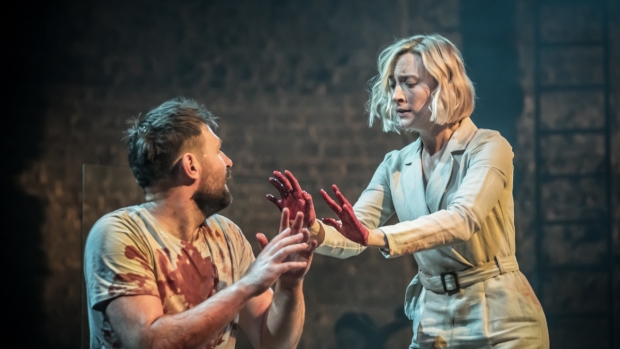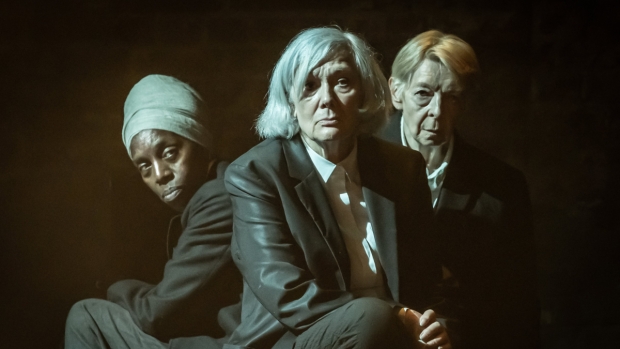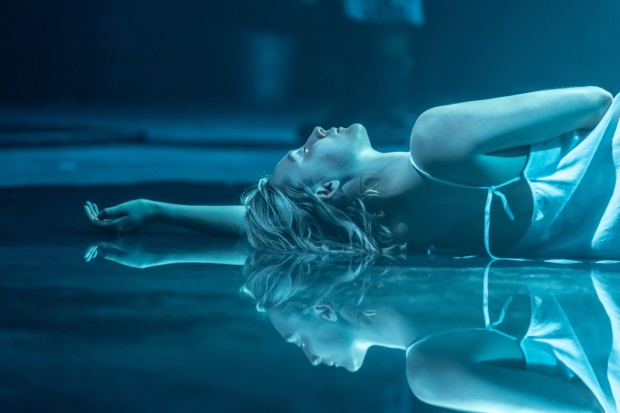Macbeth with James McArdle and Saoirse Ronan review – a sensational Scottish play at the Almeida
Shakespeare’s tragedy returns

© Marc Brenner
For so popular a play, Macbeth is surprisingly difficult to get right on stage. I can count on the fingers of one hand the number of productions I have admired, and probably on three fingers those I have loved. This, starring James McArdle and Saoirse Ronan, making her British stage debut, is one of those. It is sensational.
There are traditionally two major problems with staging the play. One is what you do with the supernatural elements, with the weird sisters who doom Macbeth from the start, setting him on the path to murder and his own destruction. The second is that although he and Lady Macbeth begin as partners in crime and ambition, she all but vanishes from the action, leaving him centre stage and alone.
Director Yaël Farber has taken bold decisions and been brilliantly brave in solving both challenges. Her liberties with the text may not please purists, but she has made Macbeth into an utterly engrossing and convincing piece of theatre, one which showcases the talents of her Rolls Royce cast, allowing Ronan to use her almost-literally iridescent charisma and McArdle to create a career-defining Shakespearean performance. She keeps both on stage more or less throughout, letting him address his monologues to her, as part of the conversations that they continue to have, and lending Lady M lines from other characters. It sounds gimmicky, but it works perfectly.
It begins glacially slowly, with the cast assembling on stage around the three witches – Diane Fletcher, Maureen Hibbert and Valerie Lilley, all with light cropped hair and smart black business suits. These are representatives of the fates; they watch the action throughout, setting each scene. Their curse of sleeplessness, represented by the sheets they cast over the marital bed, echoes through the play. So does Vera Lynn's "We'll Meet Again" which plays very quietly here; later it accompanies a glamorous dance for the Macbeths when they become King and Queen.
Through murky light and smoke the outline of Soutra Gilmour's sparse set is clear: a clock, a ladder, a wheelchair, reflective sheets of Perspex that become room dividers and glittering mirrors. A tap drips; later it will run, flooding the action, emphasising the theme of hands that can never be clean. There's a cellist (Aoife Burke) who plays throughout, becoming a participant in the action, providing its musical backdrop (composed by Tom Lane, combining with sound by Peter Rice). The costumes (Joanna Scotcher) are at once modern and Scottish, timeless and universal; the accents are Celtic.
Everything in the production combines to create a sense of claustrophobic intimacy, an arena where the evil in men's hearts is revealed through the actions of a couple who love each other but are too ambitious for their own good. Tim Lutkin's magnificent lighting often sculpts them in white light, highlighting their beauty in contrast to the horror they are unleashing around them.
Farber and her movement director Emily Terndruf create tableaux that pinpoint their psychology.

© Marc Brenner
Duncan (wonderful and frail William Gaunt) is in a wheelchair; when he arrives at the castle, Ronan kneels before him like a loving daughter. The banquet scene is full of children – the childlessness of the Macbeths, the fact that they murder to put other people's children on the throne, is keenly felt. It is the murder of Lady Macduff and her children – which she witnesses – that precipitates Lady M's descent into madness.
It's a hugely intelligent reading. This is a Macbeth where you feel every moment of the action has been analysed and felt. The entire cast is superb, with Akiya Henry's Lady Macduff unusually prominent and moving, and her husband, in Emun Elliott's performance, more contemplative than usual.
But obviously, the heavy lifting falls on the leads. Ronan makes Lady Macbeth conversational, a woman totally obsessed with her husband, registering her changes of mode by tiny gestures or the flick of an eye. When she is left exposed as Banquo's ghost disrupts dinner, she is fierce in her attempts to keep her husband in line; afterwards, she crumples into a restless sleep from which he wakes her to confide "we are but young in deed."

© Marc Brenner
McArdle's performance is more assertive but just as subtle. He convinces you that this Macbeth might not commit murder; once he has done so, he never becomes hardened to the brutality of what he has become. It tears him apart so that his final soliloquy "Tomorrow and tomorrow and tomorrow", spoken softly sitting on the ground alongside Lady M's body, is simply a recognition of the emptiness he always knew was coming.
He lives inside the language, making every word seem full of heft and meaning. It's an astonishing performance inside an exceptional production. It is, inevitably, sold-out, but fortunately everyone has a chance to see it when it is live streamed for five performances from 27 to 30 October. You won't want to miss it.












